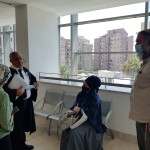Thursday, August 6, 2020, 16:33 In light of new evidence in the Kfar Duma case, please see below links to relevant background information.
For a selection of posts describing Honenu Attorneys’ representation of defendants and GSS interrogatees, see here.
Posts of special interest are:
Many irregularities in Kfar Duma case
Bill of indictment contradicts eye witnesses
Expert opinion: Kfar Duma graffiti not by Ben Uliel
Kfar Duma resident speaks to PI
“Duma Blood Libel” Facebook page administrators to distribute booklet
To familiarize our readers with the case, Honenu has gathered – see here – various articles and short videos on the subject.
On Thursday, August 6, a deliberation took place at the Central District Court in Lod at which the two sides, the Attorney General’s office and Ben Uliel’s attorney, presented their opinions and summarized their claims in the process of examining the new evidence in the Kfar Duma trial. Ben Uliel’s Attorney, Asher Ohayon, requested that the panel of judges exonerate Ben Uliel in light of the new evidence presented in the case, the version of events described by Ahmed Dawabshe, which contradicts the version of events described in the verdict handed down to Ben Uliel.
Ahmed Dawabshe was seriously injured in the arson attack on his house and has recently revealed that he witnessed the incident and remembers details. In interviews in the Arabic-speaking media, which have been submitted to the court by agreement between the sides, Ahmed recounted that several arsonists, more than three, were involved with the incident and they entered the family’s house and clashed with family members. This version of events completely contradicts the evidence on the basis of which Ben Uliel was convicted of murder, according to which there was only one arsonist at the scene and he did not enter the house.
In addition to Ahmed’s version of events, a relative of the family, Ibrahim Dawabshe, described what he saw on the night of the arson. Ibrahim, who had come to the family’s house after he heard shouts, gave testimony that he saw several arsonists near the door to the house. At the deliberation Ohayon stated that Ibrahim’s testimony is greatly strengthened by the newly revealed version of events from Ahmed.
The court has already convicted Ben Uliel. After the verdict was handed down, by means of the interviews in the media, it became known that Ahmed, who was in the house at the time, had seen the incident and remembers details. In light of this, Ohayon filed a request with the court to summon Ahmed to give testimony. In an unusual step, the judges accepted the request and in an even more unusual step began proceedings to hear testimony after a verdict has been handed down, thereby reopening the trial for all intents and purposes.
Ahmed and his grandfather, Hussein Dawabshe, were summoned to the court to give testimony. After Ahmed refused to come to court due to the trauma he had experienced during the attack, the sides agreed to submit recordings of the media interviews to the court.
On August 6, after the evidence was submitted, the sides summarized their positions before the panel of judges. Ben Uliel’s attorney requested his exoneration. Representatives of the Attorney General’s office explained that it was impossible to rely on Ahmed’s version of events for several reasons, among them his young age. The judges scheduled a deliberation for one month’s time, and will then announce their decision on the new proceedings.
Amiram Ben Uliel’s attorney, Asher Ohayon spoke after the deliberation: “Today was the stage at which the court was asked the question of whether or not this most important piece of evidence is sufficient to change their original conviction. We succeeded in demonstrating that this evidence is substantial. There is a potential for exoneration.
We then demonstrated that this [Ahmed’s] is the most reliable version of events. There is no grounds for concern that the boy recounted things that he did not experience, quite the contrary. If the boy experienced what he described in such detail, very vividly, very authentically, there is no option other than to exonerate Amiram Ben Uliel, and that is what we expect to occur.”

